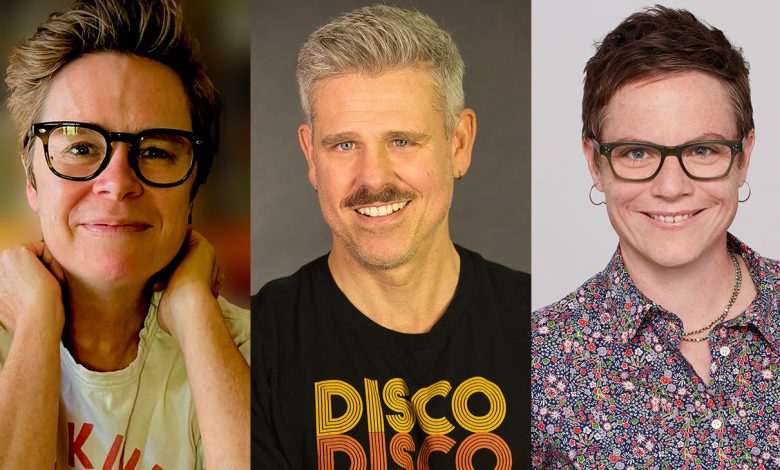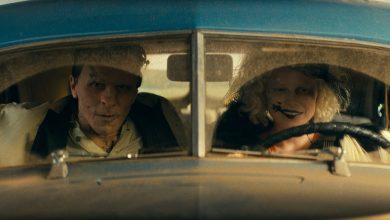Chris Nee, Rainbow Project Founders on Launching the Velma Awards and the State of LGBTQ-Inclusive Kids Media

This past summer, while having dinner with longtime friend Kristi Reed, the Peabody and Emmy-winning creator of Doc McStuffins, Chris Nee, found herself once again ruminating on the challenges of making content in the kids and family media as a queer creator.
“We were bemoaning how hard it is for people to understand our space and how difficult it’s been to have a good awards system for it,” recalls Nee. “How from the beginning, we’ve just wanted a sense of joy and celebration, for it to feel a little different than the bad chicken dinner and all the tables.”
That’s when Nee, who also heads up production company Laughing Wild and is currently staging her original musical Finn at the Kennedy Center, “made an off-hand comment that we should just start our own awards,” says Reed, a prolific voice and casting director in the animation space. “This was really Kristi and I saying it would be great if we could give out our own awards, and then 20 minutes later, being like, ‘Wait a minute. Why can’t we give out our own awards?’” adds Nee.
They eventually reached out to Jeremy Blacklow, who the duo met while they were members of GLAAD’s Children and Families Advisory Council and he was serving as the nonprofit’s Director of Entertainment Media. Composed of showrunners, directors, screenwriters, and other industry members who could lend their shared prowess to projects featuring LGBTQ+ characters and storylines, their tenure would span the launch of the GLAAD Media Awards two kids and family categories.
“We’re so excited that those categories continue to live on, and that GLAAD continues to recognize the great representation in the space,” Blacklow tells The Hollywood Reporter. “But we wanted something that would focus exclusively on queer representation in kids programming. There are easily 10 to 15 projects a year that are brave, daring, and changing hearts and minds, and they all deserve to be recognized.”
So the trio spent the last several months building and launching The Rainbow Project, as well as its respective awards, The Velmas — the name of which Nee and Blacklow credit to Reed. “Most people can point to that thing that impacted them as a child. For Chris, Kristi, and I, it was seeing the queer-coded Velma on Scooby-Doo,” explains Blacklow. Both the organization and awards officially debuted this past Monday, an effort to celebrate and elevate LGBTQ+ representation in kids and family media, including creators who push the boundaries of storytelling to produce positive mirroring for a new generation.
The honors will be announced on Dec. 10 and are set to feature 12 unique categories in their inaugural run, all designed to celebrate the distinctive achievements of individual LGBTQ-inclusive series. Winners — which will span genres, linear and streaming, pre-school to young adult, as well as live action, puppetry, and animation — were selected by the trio based on the recommendations of fellow creatives who, like Reed and Nee, are “heavy hitters that are queer and in the animation and children’s programming space,” says Reed.
“This format will give us the chance to be super nimble in our goal. There is a joyousness in what we’re trying to do, of just saying, ‘Let’s celebrate the people and the work,’” Nee says. “These are tough, tough times. This allows us to look at the whole landscape and find anything we think should be celebrated, and do that in the best possible way, but in a queer version. We’re queering the award show.”
***
Between the GLAAD council and their combined decades of industry experience, The Rainbow Project founders know firsthand how awards can spark change.
“We saw the success that we had with the GLAAD’s Children and Families Advisory Council and this coalesced for me with the Business Insider piece that tracked the numbers and history of queer representation in children’s media. GLAAD put their first award up in 2018, and if you look at those numbers, between 2017 and 2019, there is a spike in the amount of representation of queer characters,” says Reed. “I think that people like to be recognized for having courage and being lauded for it is something that should be done, but also moves a needle sometimes.”
Yet for many in the industry, the awards model — which includes “one winner and four losers” alongside predetermined category representation — is “broken” in some ways, says Blacklow. “The kids categories have always been really complicated for mainstream awards. You’re either the kids table at larger events, where they might give you one category — or you get no categories,” says Nee. Even when her historic Doc McStuffins episode aired as “the furthest edges of what we’re allowed to do in preschool TV, the only category I could put it in had it up against Transparent,” she recalls. “These two things can’t be in the same space.”
In the years since, the GLAAD Media Awards expanded its kids media honors from one to two categories while NATAS made the Children’s and Family Emmys, which honors general excellence, its own event. Yet, with definitions of age appropriateness and representational expectations around “LGBTQIA+ forward” storytelling being different in a show for preschoolers versus teens, “how do you compare those two things? We’ve just said we’re not going to,” Nee tells THR. “We’re going from preschool through the Heartstopper demographic, which feels like it’s still for a younger audience. Marvel’s Agatha All Along came up at one point, but we said no. While kids may watch it, it’s a show for an adult audience.”
With The Velmas, the awards will not only leave room to honor “what the actual unique challenges are of storytelling in different kids spaces,” says Nee, but serve as an opportunity to “just recognize excellence,” adds Blacklow. Reed describes the awards’ current structure as “as fluid as our community. We found the content that we felt was doing brave and courageous work, and then we crafted a category for that work. We didn’t try to force anything into a box that it wasn’t already in. We want to be able to award the work for its nuanced specificity.”
“We’re not pitting people against each other,” adds Nee. “That was something that we really felt strongly about.”
***
The Rainbow Project created The Velma Awards in part to respond to the challenges within the larger awards system for kids and family content, as well as issues unique to the recognition of children’s and LGBTQ+ creators. But the honors are also responding to a particular moment in the industry, in both deliberate and unintentional ways.
“We saw a surge [in representation] from 2018 to 2020,” Blacklow tells THR. “And by 2021, I think we started to see a retreat. Maybe [the pandemic] played into that. Maybe the culture wars. But that contraction, it scares all three of us, because we have come so far and we don’t want to see our [industry] go backward.”
In addition to the shadow of a potential Animation Guild strike (fears around which have receded following a recent tentative deal with the AMPTP), this year has seen major production contraction across Hollywood, with layoffs, outsourcing, and less available work overall. As a result, animation workers, who make up a notable chunk of the kids and family space, have been out of jobs, some for over a year.
That’s on top of the tax write-offs and library removals, shelving of unreleased series, or cancellation of already airing animated content — starting publicly in at least 2022 before it began en-masse — following several studio mergers and streaming cost-cutting moves. “There’s so much out there that is struggling, my work included, and that seems to be the general narrative,” says the Emmy-winning Reed. “The queer creatives that are trying to do very inclusive shows and trying to put work out there can’t get it out of development right now.”
“The whole business, especially the kids business right now, is in a place of retraction. And inherently, in any business when you’re retracting, people generally go for the safe bet,” says Nee. “What that translates to is that anyone doing storytelling that is outside of what we consider the mainstream — those are not the swings or the places where anyone is looking to take a stand right now. It just inherently closes down some of those doors, and it brings it back to a place that is much more of the business that I’ve been used to.”
Along with general business challenges, the election of Donald Trump further fueled an ongoing sentiment within corners of the entertainment industry that have been growing over the last two years. From the exodus of DEI leadership to anti-LGBTQ+ attacks on popular YouTube kids creators, and the even more recent leak of an unaired Marvel’s Moon Girl and Devil Dinosaur episode exploring the subject of trans children in sports, some increasingly feel like the industry is pulling back on its commitments to inclusion.
It’s a moment Nee sees real potential for kids indie content to thrive, but it’s going to take some “boldness” to do so. “I do hope the indie-sphere comes roaring back to life. I hope people go tell the stories that they feel like they can’t tell in other places,” she says. “I hope people get excited about that as best they can. And I think there are ways to make real money doing that so that it isn’t a version where people suddenly have to go back to not being in this business to tell the stories that they want.”
The Ada Twist, Scientist, and Ridley Jones creator also acknowledges that change can still come through the studio system — as evidenced by several of The Velmas’ honorees — but creatives will have to be more patient.
“I want us in the studio system. The studio system is so freaking powerful,” Nee says. “But in the studio system, I had to wait quite a few years to tell a story that had anything to do with my own family. I asked every year, and then I waited until I had enough power. So is this the time you are going to get your lead character, all queer action heroes? No, but keep pitching the storylines. Keep doing the work, keep having conversations. Don’t just take no as an answer. I want to know that there are enough people who still have their eyes on the things that deeply matter, and that’s really good storytelling for kids.”
***
Fears over ongoing business challenges and what the larger political climate of Trump’s second administration might pose for the industry’s inclusive kids creators are present, with Nee noting that “if you’re talking about the people who control access to being able to make this programming, I think they’re back in a more fearful place.” But, she says, “that’s been going on since before the election. We can pretend that the shift is happening right now, but it started to shift away from a celebration of this kind of storytelling years ago.”
“In the cultural atmosphere we’re all living in at this moment, there are excuses out there for people to retreat from telling these stories,” adds Blacklow. “And we have noticed in the last couple of years a lower volume of projects involving queer representation in the space of kids and family programming. But we all feel very strongly that great work deserves to be acknowledged and rewarded.”
With The Velmas, The Rainbow Project aims to do that, and possibly more in the future, with the trio sharing that they’ve considered expansions into publishing honors, serving as a resource for creatives looking to incorporate LGBTQ+ inclusion into their stories, and maybe — maybe — even an in-person ceremony. Before its winners have even been announced, the awards have already given at least one of its founders “so much more of a feeling of control of a narrative that we thought was getting taken away from us,” says Reed.
“As we were thinking about creating these awards, we saw it’s not just the normal stress points right now,” explains Nee. “When you have a J.K. Rowling out there tearing down trans creators, trans executives, trans people so directly, I just want to remind people we’re cheering for them. I want to remind people in the face of so much explicitly terrible energy coming their way, that there are still people cheering for creators who are doing the work and putting themselves out there. I think it is harder and harder to do so, and more dangerous.”
Above all, the project wants to focus on being a light and reminder for creators willing to tell diverse stories within a difficult climate. “It’s what we set out to do last summer,” says Blacklow. “But the importance of it feels, right now in the aftermath of this election, and how heavy the world feels, so much more powerful.”
Source: Hollywoodreporter
Related Posts
- Roundball Rocked: With NBA Return Looming, NBC Purges Scripted Roster
- SoundCloud Says It “Has Never Used Artist Content to Train AI Models” After Backlash on Terms of Service Change
- Fox News’ Camryn Kinsey Is “Doing Well” After Fainting on Live TV
- Kerry Washington and Jahleel Kamera in 'Shadow Force.'
Courtesy of Lionsgate
…
- This Alternative Artist Landed a Top-20 Chart Debut With an Album Made Almost Entirely on His Phone





